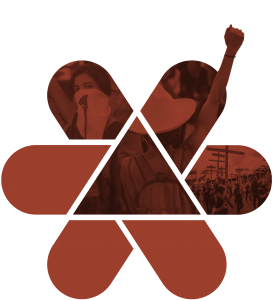Articulación brought the feminist agenda into the public debate, strengthened digital activism, protected activists, and deepened collaborations among civil society actors.
Download case studyDescarga el estudio de caso

The movement is involved in processes to find peaceful solutions to Nicaragua’s current crisis, ensuring that women’s rights are central to any potential solutions.
The Articulación has worked alongside new and emerging youth-led movements born out of the April 2018 protests and resulting national crisis. It has brought the feminist agenda into the public debate, strengthened digital activism, and deepened collaborations between different organisations focusing on democracy, justice and rights. The Articulación has contributed to enabling some youth movements and women’s movements in the interior of the country to connect to national networks and has worked to protect activists from attack in a context of severely closed civic space and repression.
Risk of physical harm
By protesting and organising, members of the Articulación risk imprisonment, where they are often subjected to violence and sexual abuse. Movement leaders face threats from the police and paramilitary groups, and as a result many have had to flee, seeking refuge in countries such as Costa Rica or Spain, an exodus resulting in significant ‘brain drain’ across the movement as the civic space has closed. Members of the Articulación have continued to protest and organise despite these risks.
Legal threats
Some feminist organisations were closed in 2018, and most groups are now under pressure because the government is constantly enacting new legislation targeting CSOs, including several recently approved repressive laws. These include the Law for Regulation of Foreign Agents, used to repress those CSOs receiving resources from international sources; a law on cybercrime, which seeks to censor digital media; and a law on hate crimes that introduces life imprisonment for political dissent, without a clear definition for what acts amount to dissent.
Pervasive machismo
By trying to alter the narrative and the ‘macho’ culture that is so pervasive throughout the country, women’s groups and feminists find confrontation not just from the state, but from their own families and communities. Sexual assault has become part of the repression experienced by activists and women, and the impunity around this must be addressed.
Sustaining coordination and engagement
Sustaining internal coordination and alliances with other movements and spaces is particularly challenging given the complexities of the context and the risks involved. The Articulación’s lack of structure or formality also makes engagement with international groups difficult, as such cooperation often requires quite rigid standards and models that do not easily accommodate social movements. It is also difficult to dedicate time to advocacy strategies vis-à-vis international feminist movements, as the Articulación is occupied with more immediate defensive and protective work. Maintaining the movement’s existence without resources or permanent support from international allies is very challenging.
Collaboration
Youth groups have their own dynamics, and it is important to take these into account and respect their ways of working, when collaborating. Young women’s groups need their own space. The Articulación underlines the importance of strengthening other organisations and movements, rather than overriding or replacing them through the neglect of their particular objectives. They also stress the importance of engaging in dialogue with groups where there is agreement on aspects related to democracy and justice, even if these groups do not entirely align with the Articulación’s agenda. In these mixed political spaces, feminists contribute by defending the exercise of full citizenship rights, promoting the role of women as political actors.
Seizing opportunities
Narrative and cultural change take time, but movements can also take advantage of key national moments. Feminist movements were able to use the crisis to highlight the nature of the dictatorship and its detrimental effects on the country and center the narrative of peaceful protest and freedom, as opposed to one of violence and war. Young people have taken up this civic struggle, and do not see war as a way out of the political crisis.
Women’s groups are operating in a dictatorship where they are seen as enemies of the state, and so their continued existence and activities are a positive outcome in this context. They are a successful and effective movement just by virtue of continuing to operate.
Specific outcomes include:
- Influencing the narrative and therefore the agenda. The movement has initiated a now institutionalised phrase ‘Free country to live’ to replace the long-promoted slogan of ‘Free country or die’. Feminists now have a much more visible role in terms of political participation and proposals for social change, and national media has picked up this analysis.
- The support of vulnerable communities through continuous work that includes supporting women victims of violence, and supporting humanitarian activities across the country.
- Securing international solidarity, through awareness-raising, preparation of reports to human rights bodies, promoting coordination of advocacy efforts with feminists in exile, and promoting solidarity for those activists who go into exile. As the movement highlights: “every text message, article, demonstration, every message of love and energy has given us strength to continue this fight for justice and the democratization of our Nicaragua.”
- The protection of activists, through legal support, security protocols, training on the international human rights system and the use of its mechanisms, and on the safe handling of information and communication technologies.